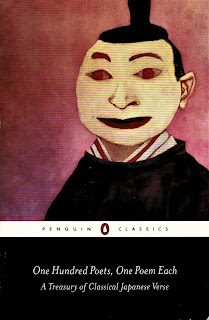100 Poets & One Poem Each: Một Trăm Thi Sĩ & Mỗi Ông Một
COMMENTARY
Poem 28 beautifully conflates natural and human imagery. The word “karu” (in the form “karenu”, 'dried up', in the poem) acts as a pun (kake- kotoba) meaning both 'to wither' and '[visitors] grow infrequent' that serves to connect the season (winter) to the poet's sense of isolation.
The word “yamazato”, translated here as 'mountain abode', can also mean 'mountain hamlet', conveying more of a sense of community and therefore not quite so isolated. The poem is a variation on one by
Fujiwara no Okikaze (fl. early tenth century):
When autumn comes
I join the crickets
in their plaintive cry,
for I know grasses and visitors
will both dry up.
(Aki kureba /mushi to tomo ni / nakarenuru /
hito mo kusaba mo / karenu to omoeba)
In poem 28, the season has changed to winter, which further deepens the sense of physical and emotional withering. In Teika's time, it was the forlorn scenery of both autumn and winter that poets found most affecting, so it is not difficult to see what Teika liked about this poem. He himself composed a variation, which he included in his private collection, Shuiguso (The Dull Musings of a Chamberlain; 1216):
Even on the path of dreams
visitors have withered
and frost settles
on the meadow grasses
as I pass the night in sleepless wait.
(Yumeji made / hitome wa karenu / kusa no hara /
oki akasu shimo ni / musuboretsutsu)
Minamoto no Muneyuki (d. 939) was a grandson of Emperor Koko (poem 15). After being reduced to commoner status in 894, he held a number of nominal provincial governorships. He was appointed amagistrate in 939, but died shortly afterwards. Muneyuki has fifteen poems in the imperial waka anthologies, six of them in the Kokinshu, as well as a private collection. He is one of Kinto's Thirty-Six Poetic Geniuses.





Comments
Post a Comment